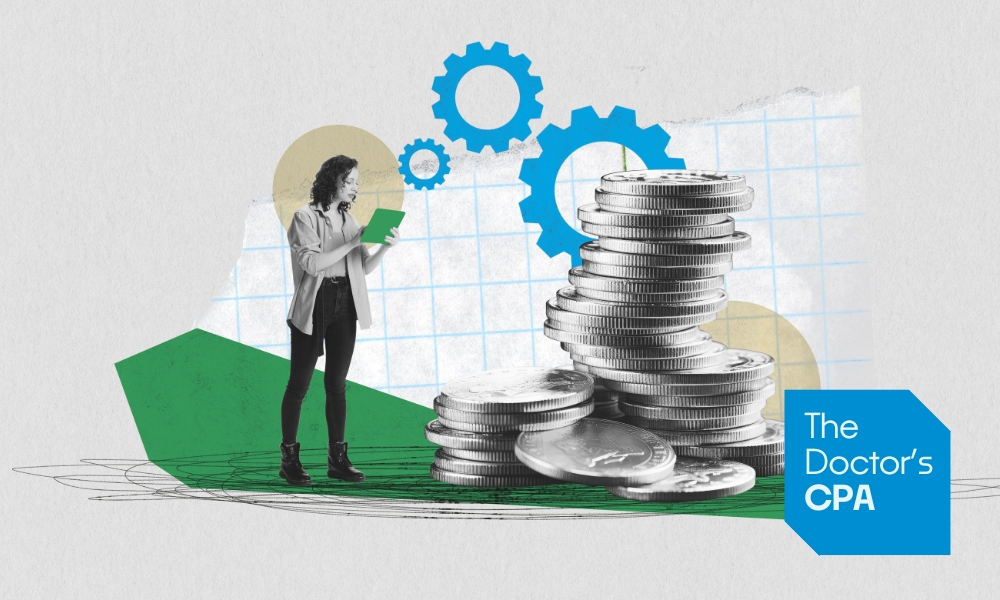A year-end bonus is a well-deserved testament to your hard work and dedication as a physician. But it can also mean a larger-than-expected tax bill.
Whether you’re a W-2 employee or a locum tenens 1099 contractor, you need to be prepared for how a Q4 bonus affects your taxes. If it’s large enough, it can bump you into a higher tax bracket, reduce your eligibility for deductions and credits, and create an unexpected bill from the IRS.
In this guide, we’ll give you the best tax tips for doctors. We’ll explain how your bonus is taxed, strategies to lower your tax liability, and implications for doctors filing as S corporations. By understanding how to plan for bonuses, you can maximize your savings while staying fully compliant with IRS guidelines.
Why a Q4 Bonus Can Trigger a Tax Surprise
Mistake 1: Failing To Plan For Quarterly Taxes
Before you plan around a bonus, it’s important to understand why it can lead to a higher tax bill. The US uses a progressive tax system, which means your income is taxed in stages, with higher rates applying only to income above certain thresholds.
Here are the 2025 federal income tax brackets:
| Tax Rate | Taxable Income Bracket (Single) | Taxable Income Bracket (Married couples filing jointly) |
|---|---|---|
| 10% | $0–$11,925 | $0–$23,850 |
| 12% | $11,926–$48,475 | $23,851–$96,950 |
| 22% | $48,476–$103,350 | $96,951–$206,700 |
| 24% | $103,351–$197,300 | $206,701–$394,600 |
| 32% | $197,301–$250,525 | $394,601–$501,050 |
| 35% | $250,526–$626,350 | $501,051–$751,600 |
| 37% | $626,351+ | $751,601+ |
A bonus can push part of your income into a higher bracket, but it doesn’t raise the tax rate on your entire income. For instance, if you earn $300,000, only the dollars above $250,526 are taxed at 35%.
Still, large bonuses can increase your total tax bill and limit eligibility for deductions and credits based on adjusted gross income (AGI). And if you are a locum tenens clinician with variable income, bonuses during high-earning years could be subject to higher taxes than those in lower-earning years.
What Counts as Taxable Income?
When thinking about how bonuses affect physician tax strategies, note that gross income is not the same as taxable income. Here’s how it works:
- Gross income includes all income you earn, including bonuses.
- Adjusted gross income subtracts eligible deductions, like student loan interest or retirement contributions, from your gross income.
- Taxable income is what’s left after the standard or itemized deduction is applied to your AGI.
Because bonuses increase your AGI, they can make you ineligible for certain deductions or credits like the child tax credit, even if they don’t push you into a new bracket. While it is always a good idea to maximize retirement contributions when possible, it is essential when you know a bonus is coming, since they can offset the increase to your AGI.
If you’re a W-2 physician, your bonus will be lumped in with your salary. For 1099 contractors and locum tenens providers, it must be reported on your 1099-NEC form and will be taxed as regular self-employment income.
Why Your Bonus Might Be Undertaxed (and What That Means)
Bonus income is considered supplemental wages. For W-2 physicians, bonuses are subject to employer withholding rules. For 1099 contractors or locum tenens providers, bonuses are taxed as self-employment income rather than through employer withholding.
There are two main ways employers withhold taxes on bonuses:
- Percentage method: Withholds a flat 22% (or 37% for bonuses over $1 million).
- Aggregate method: Adds the bonus to your regular wages and applies your normal withholding rate.
For high earners like physicians, 22% is often less than their actual marginal tax rate. That means you may end up owing additional taxes at filing time if too little was withheld.
5 Tax Tips for Doctors: How to Offset Bonus-Related Taxes
A bonus doesn’t have to mean a bigger IRS bill if you reduce your taxable income before December 31. Here are a few common strategies:
- Max out retirement contributions:
- Solo 401(k): Up to $70,000 in 2025 for self-employed doctors.
- Traditional IRA: Up to $7,000; contributions may be deductible.
- SEP IRA: Contribute up to 25% of net earnings, capped at $70,000.
- Contribute to an HSA (if eligible): Health savings accounts let you deduct contributions, grow investments tax-free, and spend on medical costs without penalty.
- Deduct professional expenses: Make deductible purchases now, like CME, equipment, or mileage, so that you can lower your taxable income this calendar year.
- Shift or defer income: Locum tenens physicians may be able to adjust billing cycles or take fewer assignments in Q4 to spread earnings across two tax years.
- Consider bonus timing: If possible, ask your employer to delay issuing your bonus until January. That simple move could reduce your current year AGI and keep you in a lower bracket.
How Bonuses Interact with S Corps
If you’ve elected S-corp tax status, you have some flexibility in how you structure earnings; however, even though you can take distributions that avoid self-employment tax, bonuses always count as wages.
That said, paying yourself a bonus through your S corporation does have limited use. When operating as an S corporation, you must pay yourself a “reasonable salary” as defined by the IRS. If you are unsure you have paid yourself that amount, you can tag on a year-end bonus to add to your gross income.
Here’s the general physician tax strategy to minimize your tax liability as an S corporation:
- Pay yourself the lowest reasonable salary for your specialty.
- Take the remaining earnings as distributions to reduce payroll taxes.
- Use a bonus to meet reasonable salary targets.
Questions to Ask Your CPA Before December 31
To make sure your finances are in order before December 31, schedule a check-in with your CPA and ask:
- How will my bonus affect my tax bracket and estimated payments?
- Have I maximized retirement contributions for the year?
- Should I accelerate deductions or defer income?
- Do I qualify for any additional credits or phaseouts?
- Have I paid myself a reasonable salary if I’m operating as an S corporation?
Regardless of whether you receive a year-end bonus or not, it’s worth it to call a professional. You will end up with a more optimized plan that saves you money.
Don’t Let a Bonus Derail Your Tax Plan
Physicians view bonuses as a reward for their contributions and commitment to patient care, and they should. But without the right tax strategy, that reward can come with unexpected consequences.
At The Doctor’s CPA, we specialize in helping 1099 and W-2 physicians navigate year-end tax decisions with clarity and confidence. Whether you’re optimizing for deductions, preparing for a large bonus, or managing multiple income streams, we’re here to help.


